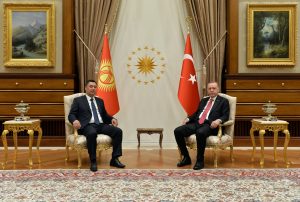Kyrgyz President Sadyr Japarov returned from a recent three-day trip from June 9-11 to Turkey with military aid a headline item and mutual ambitions to reach a trade turnover of $1 billion.
Japarov reportedly asked Turkish President Recep Tayyip Erdogan about the suspicious disappearance from Bishkek of Turkish-born educator Orhan Inandi. Japarov’s spokesman, Erbol Sultanbaev, told RFE/RL’s Kyrgyz Service, “Erdogan replied that he did not know him [Inandi], he had no information and that he didn’t want to hear anything about FETO supporters.”
FETO is the acronym for “Fethullah Terrorist Organization,” the Turkish government’s labeling of the movement founded by Fethullah Gulen. Gulen’s movement, prior to his falling out with Erdogan, was a powerful tool of Turkish soft power, largely in the form of schools opened around the world, including in Central Asia. Inandi, a Kyrgyz citizen since 2012, founded such a school system in Kyrgyzstan in the 1990s. It remains one of the country’s best educational institutions.
An alleged coup in Turkey in the summer of 2016 was blamed on Gulen and FETO. Only Pakistan and Northern Cyprus share Turkey’s designation of FETO as a “terrorist” organization, but Ankara has not been shy about pressuring states to close Gulen-linked schools and deport individuals it deems as being part of the network.
Kyrgyzstan has walked a delicate line with Turkey since 2016. On one hand, Ankara is an important partner for Bishkek; on the other, the Gulen-linked schools in Kyrgyzstan educate the children of the country’s most influential people. Its graduates work across the Kyrgyz government, and closing it down was not a palatable option. Kyrgyz authorities also rebuffed repeated attempts by Turkey to extradite some of the school’s employees, including reportedly Inandi, as recently as 2019.
Inandi’s disappearance in early June had many hoping Japarov would press the issue on a scheduled visit to Turkey. But in a joint press conference following their June 9 “tete-a-tete,” Erdogan said that combating terrorism, “including FETO” were among the discussed topics. Erdogan characterized FETO as a threat to both Turkey and Kyrgyzstan, alluding to FETO involvement in Kyrgyzstan: “Recent incidents have once again unveiled FETO’s dark and ugly face. We will inshallah join forces and overcome this threat together.”
It’s unclear exactly which recent incidents Erdogan was referring to, but the Turkish president did offer regrets as to the recent Kyrgyz-Tajik border clashes and stated its support for peaceful resolution between the two neighbors.
According to Kyrgyz readouts of the meeting, the Turkish side “expressed a desire to provide military-technical assistance to the Ministry of Defense of Kyrgyzstan on a grant basis.” That was not mentioned in the joint press conference, according to the Turkish side.
The two presidents said they aim to nearly double bilateral trade from $507 million to $1 billion, though no target date was suggested.
They also met within the framework of the Supreme Council for Strategic Cooperation between Kyrgyzstan and Turkey. The two countries elevated their ties to a strategic partnership a decade ago and hoped to deepen bilateral and multilateral cooperation, particularly with regard to the “trade-economic, military-technical, cultural and humanitarian spheres.”































